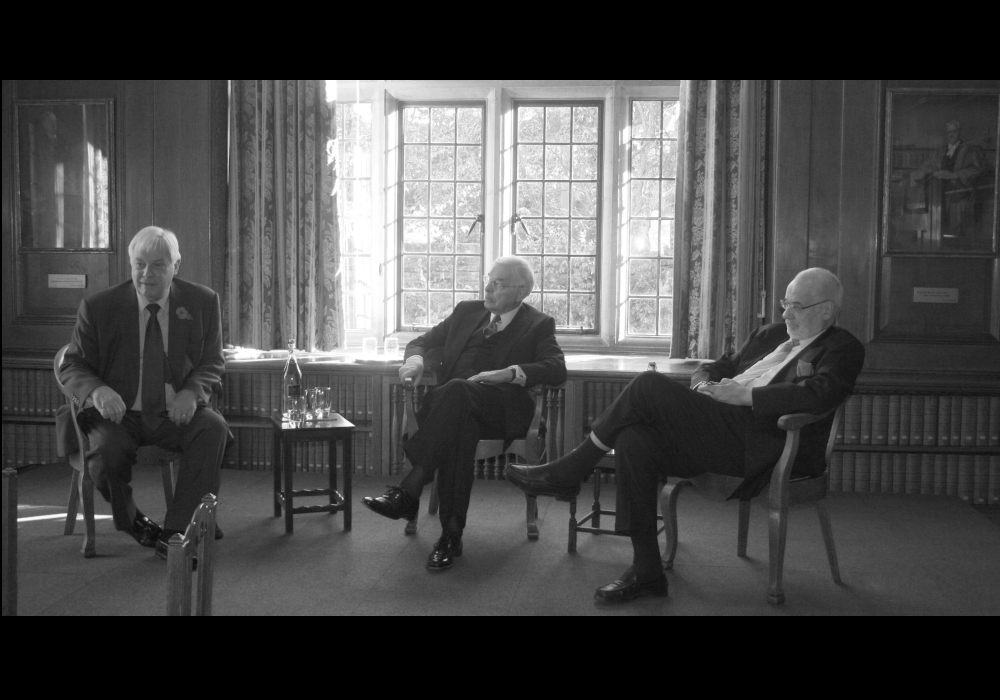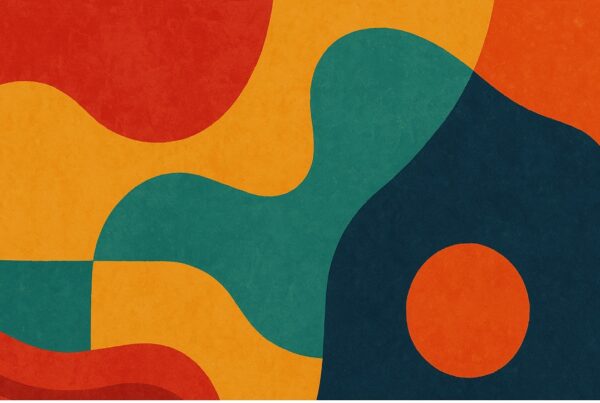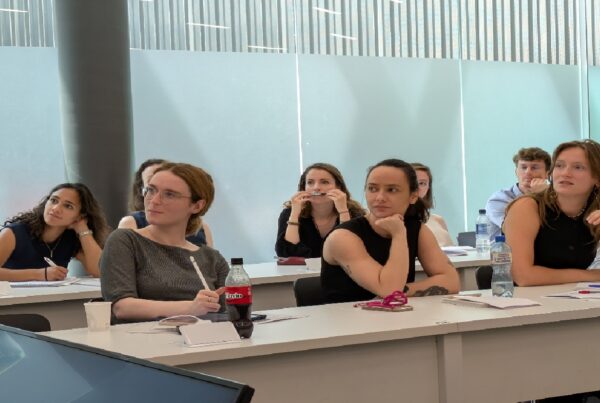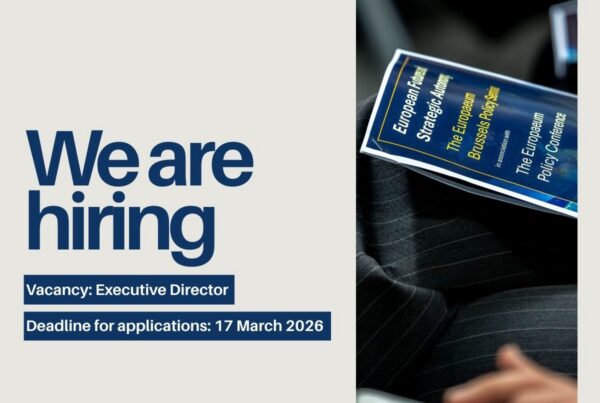
The image above shows a discussion between Lord (Chris) Patten (left) and Dr Erhard Busek (right), chaired by Dr Pierre Keller (centre). This was held at Rhodes House to mark the Europaeum’s 20th anniversary in 2012. The discussion ranged over topics such as South-East European politics, the future for the EU, the Eurozone crisis and what the impending US election might mean for Europe.
Paul Flather shares his memories of Erhard Busek
Erhard Busek, former Deputy Chancellor of Austria, who did so much over several decades to promote Europe and cross-European links and to boost and, indeed, reform science and education, passed away on 13 March 2022 aged 80.
It was his intellect, knowledge, and expertise on East-Central Europe and the Balkans, which made him much in demand as the region ‘re-joined Europe’ after the 1989 revolutions. It turned him into a senior and much respected statesman, who would be rewarded with many posts, offices, medals and honorary doctorates.
Among these he served as a stalwart member of the Europaeum’s Board of Trustees from 2012 onwards, always probing with gentle and wise counsel, helping to guide the organisation forward.
Busek will be remembered as one of Austria’s leading liberal politicians who helped hold the line against the rise of the far right under Jörg Haider and others, and for steering his country, with Franz Vranitzky, into the European Union in 1995.
I first met Erhard in 1991, two years after he had been appointed Austria’s first Science Minister and then Deputy Chancellor, when representing George Soros in negotiations over where to base his new Central European University (CEU). I was able to remind him that Austria had long seen itself as ‘The Gateway’ from East to West Europe, and the CEU could be critical in maintaining this. He responded by offering me a free schloss. In the end we settled in Prague. But we got on so well that we kept in touch. He invited me to take part in a national panel on the future of Austrian universities, and I in turn remembered him when we sought European figures of stature for our new Europaeum board. It was also a choice strongly approved by Europaeum founder, and fellow Austrian, Lord (George) Weidenfeld.
Busek was born in 1941 in Vienna, into a Catholic faith which he embraced, the son of an engineer and builder and a trading family on his mother’s side. In 1964, after graduation, he entered politics with the Austrian People’s Party (the ÖVP), rising to General Secretary. He joined Austria’s National Council, becoming an MP from 1975 and entering influential Viennese municipal politics the following year.
He lost the party chair in 1989 but was made Science Minister and later Education Minister in Franz Vranitzky‘s government. He encouraged a new national emphasis on science, perhaps never central in the cogs of the old Austro-Hungarian Empire. Then as Education Minister, Busek pushed to “emancipate universities from the centuries-old regulatory addiction” (rather Hapsburgian) with what was considered a controversial new University Organisation Act (UOG).
Notably, he also spoke out, successfully in the end, in favour of Slovenian independence, an issue that had divided European thinking. No wonder Slovenian Prime Minister Lojze Peterle was quick to remember Busek warmly as a “visionary”. He also did much to boost Slovenian civic society while Chair of the European Forum Alpbach (2000-12).
After 1995, he ended up as chair of an influential regional think tank, the Institute for the Danube Region and Central Europe (IDM), which he re-categorized as a ‘do-tank’.
From 1996 he was the coordinator of the South East European Cooperation Initiative (SECI), then in 2000-02 Austrian envoy for EU enlargement – which he felt was essential – and in 2002-08 Special Coordinator of the Stability Pact for Southeast Europe.
It was an expansive career. As fellow Trustee and former Czech Foreign Minister, Karel Schwarzenberg, recalled, “He was the last Austrian politician after Bruno Kreisky who still had a vision of what Austria could be.” Lord (Chris) Patten, Chancellor of Oxford University, Chair of the Europaeum Board of Trustees, and himself a former EU External Relations commissioner, adds: “Erhard Busek was a wise and committed supporter of the Europaeum. He was also a very nice man, generous-spirited and loyal to eminently good causes.”
Busek was gentle, humanitarian, liberal, a man who believed in a meeting of the minds as a key to the European endeavour. “A treaty makes no change; it is a matter of education,” he would insist. This played into lifelong commitments to research and balanced cooperation, backed by programmes such as Erasmus, and the IDM work. It was this that made him ideal for the Europaeum.
I remember him as a big bear of man, invariably towering over his counterparts, always with a smile, a strong welcoming handshake, a dry wit chipping into committee discussions with telling remarks.
We once held an interval meeting at the Vienna opera, surely the city’s unchallengeable cultural high spot. It was early 1991, and he had just become Deputy Chancellor. As we walked the famous round, every member of the city’s great and good sought him out for a word, advice or friendship. We had to meet the next day in his office to pursue our business.
Busek delivered lectures on domestic and foreign topics at home and abroad, including as a Visiting Professor at Duke, USA, and in Vienna. He amassed many honorary doctorates, including from Europaeum member, the Jagiellonian in Kraków.
In 2008 he was awarded the Jean Monnet Professorship ad personam, which he held at the Salzburg University of Applied Sciences and the University of Graz. He received many international awards and decorations, including from Poland, Hungary, Italy, Bulgaria, Liechtenstein, Romania, Czechia and Slovenia.
Recent news and images from Kyiv, Lviv, Mariupol and other cities would have brought back troubling childhood memories of 1940s Vienna. Peace and stability on the European continent were a maxim throughout his life.
Indeed, his words in a recent interview seem somewhat prophetic: “Equating the EU with the Europe means leaving out a quarter of the continent – and a rather important part, as Eastern and Southeastern Europe border on world powers and vital regions.”
It seems a fitting tribute, then, for EU Commissioner, Johannes Hahn, to say: “Even after his death, Erhard Busek will be a role model for everyone who had the honour of working with him.”



